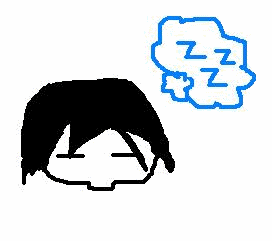- Street drugs and/or alcohol are not a primary cause of psychosis; they may help to worsen symptoms, increase the person's vulnerability to relapses and rehospitalizations, and/or impair the protective effects of anti-psychotic medications.
- Street drugs or alcohol can complicate the treatment of the person with psychosis because they may be more difficult to engage in treatment programs, vocational programs, or therapy. There are also financial, legal, health, housing, interpersonal, and family problems associated with a person with mental illness using street drugs and/or alcohol.
- Dual diagnosis is defined as the combination of a major mental illness and a substance abuse disorder.
- Person with psychosis may use drugs and/or alcohol due to:
- boredom
- inducing pleasure
- depression or anxiety
- increase opportunities for social contact
- side effects of medications
- temporary relief from symptoms of the illness

from http://www.hopeforanxiety.com/images/AnxietyAnimated.gif
 |
| from http://www.unodc.org/images/odccp/26june0709/animated_logo.gif |
Assessing alcohol and drug use:
- If possible, discuss with your family member's mental health professional, doctor, etc. and consult on how you can help your family member or friend who is using alcohol and/or drugs.
- Therapeutic approach is to avoid heavy confrontation and intense emotional interactions which can create additional stress and reactions in people with psychosis. A non-confrontational approach based on education, support, and discussion is more effective, especially in one-to-one and/or group setting. Avoid judgmental and/or blaming statements. Be willing to listen to the person rather than interpret behavior.
- Talk to your family member and ask in a straight-forward, matter of fact way if they are using alcohol and/or drugs. However, denial of alcohol and/or drug use is no guarantee that your family member is not abusing.
- Look for worsening of symptoms that cannot be accounted for by medication non-compliance or current life stressors.
- Look for noticeable decline in functioning
e.g.failing to meet expectations that were formerly met (being late, sleeping in, not doing house chores, etc) - Alcohol or drug paraphernalia (e.g. rolling papers, pipes, cut plastic tubes for snorting cocaine, small bags for storing drugs, etc)
- Financial difficulties (i.e. not having any money or repeated efforts to borrow money from friends and families).
- New set of friends in a short period of time.
 |
| from http://www.capriogroup.com/webstuff/Images/AnimatedGIFs/Animated-CartoonDoctor.gif |
 |
| from http://i37.photobucket.com/albums/e65/KAGEnoSORA/Animation7.gif |
 |
| from http://mindmillion.com/images/money/01-money-burn-anim.gif |
END!
A drug or alcohol abuse intervention can stop the cycle of addiction just long enough to give the addict time to think more rationally and make better decisions. Drug Intervention
ReplyDelete